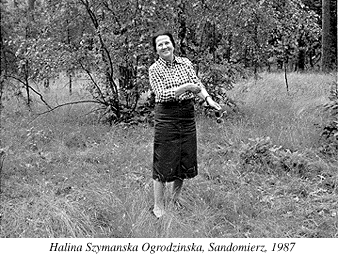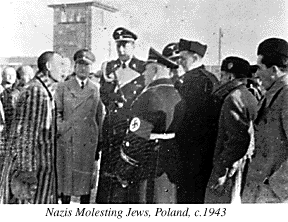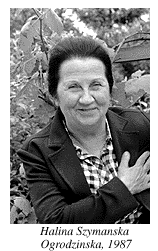HALINA SZYMANSKA OGRODZINSKA TELLS HER STORY (Conclusion)


HALINA OGRODZINSKA: It was the only period in my life that I lived together with Basha. We had a two room apartment on a nice quiet street. Under the floor of one room was a very sophisticated storage place where every evening we carefully hid Basha's Zegota documents. We felt there was a good chance we wouldn't be found out: the Germans couldn't look everywhere, after all.
At times Basha's work was very nervewracking--it was hard for her. She had to help people going from one place to another: to buy them train tickets, or to look out for someone, very tense, who was going to the train station. She took it all to heart, and it was exhausting.
But then in Tarnobrzeg perhaps it was also a bit dangerous. In one room Basha had these two Jewish people, Olga and Marysia. I don't think Basha even knew Marysia before. It was characteristic of my mother and sister that they would have needed much more courage to turn them out than to give them shelter. It was very dangerous for everyone around. Olga was not always there, but often enough for people to notice. She looked very Jewish, everyone could see that.
It's not easy to say just what it was that made people look Jewish. Sometimes it was the bad pronounciation of Polish words. Other times it was their nervousness that gave them away. Some people had a certain look to their face, to their mouth. Perhaps it was something in their attitude. The police knew when someone was a Jew because they did not look at them directly and were nervous--they looked afraid. They could almost smell Jewish people. Well, the Polish people were nervous too. When the Germans began offering two hundred Deutsch marks for turning in a Jew, some people started noticing these things-- this one looks like this, that one is like that. It was a public madness.

Basha's arrest was somewhat the fault of the Zegota central office in Warsaw; they gave her too much to carry. She took this suitcase with a false bottom in which they hid a great many documents. She also had a thermos with the paper insulation between the inner and outer bottles replaced with money. She had a lot of things.
When Basha was arrested she was badly beaten, but somehow she remained optimistic and was able to send news of herself to our youngest sister Hanka in Sandomierz. Hanka was small, blond, and thin. She often wore a blue sports jacket and white knee socks, and looked a little bit like a Hitler Jugend. She came like that--a very brave girl--to the Lublin Gestapo asking for her sister and insisting that they deliver the food package she brought to Basha. Most likely expecting to frighten her, the Gestapo left this little girl alone in a room with a huge, fierce-looking dog trained to attack people. When he returned Hanka and the dog were playing together--she liked animals. The Gestapo officer accepted her food package.
When I first found out about Basha's arrest I was afraid, and I was sorry. I didn't know what to do. I thought even if we changed houses the Gestapo would still find us. Of course, we immediately changed every address. Later, the owner of the house where we had been living told me that the Gestapo had come. They forced the door and searched, but found nothing.
Some people in our group didn't believe Basha would be strong. She wasn't a member of the party, and had been with us for only a short time. The organization tried to work through cells of five people, to protect us from knowing too much, but in actuality everybody knew everybody else very well--we were all friends. Barbara knew a lot of people and a lot about what everyone did. She could have endangered many lives. Somebody in the group said to me, "Oh, that girl will be beaten and then everything will become clear to the Gestapo." Another friend, a very strong woman, was convinced that only she was strong enough for such a situation and that small young girls like Basha were too delicate and not trustworthy.
But Basha was very good; she never said anything. She made up a crazy story about falling in love with a handsome young man she met in Maria Czujko's cafe--Maria Czujko was well known to be on good terms with the Gestapo. Basha only knew this young man's first name, but she was so much in love, she promised she would go to Warsaw as a favor for him. She didn't know his address or anything else about him because they always met in this "false-Deutsch" (Nazi-friendly) cafe. All she knew was that he was so handsome. Her story couldn't have been more stupid, but perhaps because it was so idiotic, and coming from a young girl, somehow they believed her.
Because Basha never revealed anything, Zegota continued to help people as before. I had seventy different addresses during this time; I moved all the time. But there were no complications. I was never arrested.
After Lublin they brought her to Lvov, and she wasn't beaten anymore. We had a way to communicate with the prison in Lvov. We sent her clean clothes, she sent us dirty clothes, and in the dirty clothes we learned to look very carefully in every seam and hem, because we might find something. She would carefully examine the bread or anything else we sent her where we could hide a message. Slawek was very proud that she held up really well in prison. He sent her his compliments.
I visited Marysia in the convent several times. I couldn't tell her anything about her mother or father. She would ask me for news of Basha. She was a sad girl, never smiling, but she liked it very much when I came to visit. I don't have an especially clear memory of her now because I visited so many friends in the same situation at that time. There were a great many small things that needed to be done for these people and sometimes it was very difficult. Those in the convent were in a good situation and didn't need our help, so we only saw her occasionally, but we knew her life was safe.
Somebody in our group must have made contact with a Gestapo officer, and that enabled us to propose an exchange of money for Basha's life. My memory of this isn't clear. We hoped only that a bribe would pay for better treatment; we never expected her liberation.
 The first time Hanka and I went to Warsaw looking for money for Basha, we were not successful. Everyone told us the same thing: there were so many people in prison, it was impossible to find enough money to help each one. Then the Polish government-in-exile in London gave its Lvov representative position to Adam Ostrowski, a member of our Polish Socialist Party. His job was to negotiate with the Soviets, if they came. I was transferred from the underground printing shop where I was working for a PPS paper, to be his assistant. He knew Basha, and took it upon himself to try to find money for her. Since he was our new delegate, everybody in Warsaw wanted to be nice to him, and he was able to put together a very big sum. It was at the time when the Russian front was advancing, and the Germans were beginning to be uncertain about the war. They were starting to liquidate the prison, and we knew that sometimes to empty a prison they would simply kill all the prisoners. They took our money eagerly, and put Basha on the transport to Ravensbruck concentration camp.
The first time Hanka and I went to Warsaw looking for money for Basha, we were not successful. Everyone told us the same thing: there were so many people in prison, it was impossible to find enough money to help each one. Then the Polish government-in-exile in London gave its Lvov representative position to Adam Ostrowski, a member of our Polish Socialist Party. His job was to negotiate with the Soviets, if they came. I was transferred from the underground printing shop where I was working for a PPS paper, to be his assistant. He knew Basha, and took it upon himself to try to find money for her. Since he was our new delegate, everybody in Warsaw wanted to be nice to him, and he was able to put together a very big sum. It was at the time when the Russian front was advancing, and the Germans were beginning to be uncertain about the war. They were starting to liquidate the prison, and we knew that sometimes to empty a prison they would simply kill all the prisoners. They took our money eagerly, and put Basha on the transport to Ravensbruck concentration camp.
Again, I think Basha's character was very helpful to her. In the prison she was active and optimistic. She looked around and tried to help other people, so there was no time to think too much about herself. For example, I am perhaps the only person ever to have received a gift from this prison--from Basha, of course. One day in her package of dirty laundry I found a wonderfully warm sweater. A Ukrainian girl in her cell knew she was going to be killed and gave away her things to the other women; Basha got the sweater. Here was Basha in prison, thinking that probably I was the one who needed a warm sweater! It seemed natural for her to give me a present. It was the same in the concentration camp when she was working in the kitchen and finding a way to smuggle out food to people who were starving. Her optimistic attitude made her strong.
In Ravensbruck Basha was always active. It was the small things that made her daily life bearable. Little things became very precious. For a while she was in a work squad of women who marched out of the camp everyday to work somewhere. A girl who had been part of this squad told me that each woman wore a little rag on her head, like a small babushka. While they were in the forest cutting wood, they always washed these little cloths so they stayed very nice and white. When they returned to the camp everyone could see how fresh and wonderful they looked. The German guard couldn't oppose something like that because the women weren't breaking any rules. But that was something special, you see. Their lives were made up of these small gestures of solidarity. I understand that very well, how important these small things are. If someone gives you something--a piece of bread perhaps--it's like a bouquet of flowers.
I didn't see Basha immediately after she returned from Ravensbruck because I was still in Lvov. I don't remember the circumstances of our first meeting, but I do remember her face. She had no teeth, from being beaten, and from conditions in Ravensbruck. She had some female problems too. She was very thin, and had very little hair. We all had poor thin hair, but especially after this period, hers would fall out. But she was so happy to be with us again, and to be alive. She had been so determined not to allow the Germans to destroy her morale in this terrible situation. She was radiant.
Halina Szymanska Ogrodzinska gave this interview at her home in Warsaw in 1987.